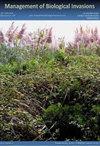Assessing the efficacy of soapberry (Sapindus rarak) crude extract for controlling giant African land snail (Lissachatina fulica)
IF 1.5
4区 环境科学与生态学
Q3 BIODIVERSITY CONSERVATION
引用次数: 0
Abstract
The giant African land snail ( Lissachatina fulica ) is a major pest that damages agricultural products and the environment, along with raising public health concerns. Although various methods have been applied to control these invasive snails, they have various limitations. The use of plant extracts is an alternative control method that is environmentally friendly and can reduce the use of harmful chemicals. This study was established to evaluate the molluscicidal effects of soapberry crude extract and to develop a molluscicide from it to control the giant African land snail. The soapberry ( Sapindus rarak ) crude extract exerted molluscicidal effects against L. fulica within 4 h. Soapberry concentration of 30% caused snail mortality of nearly 90% in 72 h. This plant extract exerted potential repellent and molluscicidal effects in the laboratory and semi-field experiments, while having no observable toxic effects on the vegetable Brassica rapa L. Thus, S. rarak crude extract at this concentration is suitable for snail control in vegetable plots.皂子粗提物防治非洲大蜗牛的效果评价
巨型非洲蜗牛(Lissachatina fulica)是破坏农产品和环境的主要害虫,同时也引起了公众健康问题。尽管人们采用了各种方法来控制这些入侵的蜗牛,但它们有各种各样的局限性。使用植物提取物是一种环保的替代控制方法,可以减少有害化学物质的使用。本研究旨在评价皂子粗提物的杀螺效果,并开发出一种用于防治非洲巨螺的杀螺剂。小檗粗提物在4 h内对白僵螺有一定的杀螺效果,浓度为30%的小檗粗提物在72 h内对钉螺的死亡率接近90%。在室内和半田间试验中,小檗粗提物具有潜在的驱螺和杀螺效果,而对蔬菜油菜无明显的毒性作用,因此,该浓度的小檗粗提物适用于蔬菜小区防螺。
本文章由计算机程序翻译,如有差异,请以英文原文为准。
求助全文
约1分钟内获得全文
求助全文
来源期刊

Management of Biological Invasions
Agricultural and Biological Sciences-Ecology, Evolution, Behavior and Systematics
CiteScore
3.40
自引率
6.70%
发文量
21
审稿时长
16 weeks
期刊介绍:
Management of Biological Invasions, established in 2010 by Dr. Elias Dana, is an open access, peer-reviewed international journal focusing on applied research in biological invasions in aquatic and terrestrial ecosystems from around the world. This journal is devoted to bridging the gap between scientific research and the use of science in decision-making, regulation and management in the area of invasive species introduction and biodiversity conservation.
Managing biological invasions is a crisis science, with Management of Biological Invasions aiming to provide insights to the issues, to document new forms of detection, measurements and analysis, and to document tangible solutions to this problem.
In addition to original research on applied issues, Management of Biological Invasions publishes technical reports on new management technologies of invasive species and also the proceedings of relevant international meetings. As a platform to encourage informed discussion on matters of national and international importance, we publish viewpoint papers that highlight emerging issues, showcase initiatives, and present opinions of leading researchers.
 求助内容:
求助内容: 应助结果提醒方式:
应助结果提醒方式:


